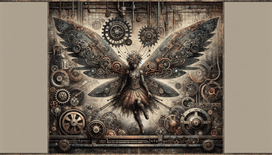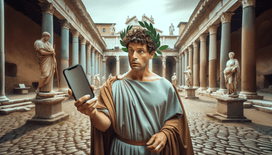Plague Rates Reduced by 78% with Simple Search Bar
Picture this: It's the mid-14th century, and the Black Death has just arrived in Europe. Villagers are dropping like flies, there are rats everywhere, and the local apothecary is about as helpful as a chicken with a typewriter. Enter Google Search, a tool so powerful it’s practically witchcraft in this era. With the aid of this mighty engine of knowledge, could the course of this infamous pandemic have been altered? Prepare for a journey that combines more speculative leaps than quantum physics, all the while asking: "What if the Middle Ages got a broadband upgrade?"
Diagnosis by "Do No Harm" .com
I can imagine that village gossip would have taken a radical turn if the locals weren't all shouting over the perfect cure-all (which usually entails drinking a potion involving boiled newt eyeballs with a beetroot chaser). Instead, there’d be a queue at the local monastery, everyone lending their grubby fingers a twiddle at the keyboard, asking Google, “What are these nasty boils on my neck?" The resulting search hits would bring them to medieval WebMD, where a curt notification stating "Please see your physician immediately" prompts a mass booking of barber-surgeons across the land.
The Path to Prevention: A Click Away
While desperate measures in fumigation using herbs and spices waft through the cobbled streets, an inquisitive Middle Ager clicks on “How to prevent the plague". Up pops the modern nuggets of cleanliness wisdom: "Wash your hands regularly, keep vermin like rodents at bay, and avoid close contact with infected persons." Sounds simple now, doesn’t it? But back then, implying cleanliness wasn't an affront to one's God-given dirt was as unfathomable as a phone without a selfie-cam.
Imagine the paradigm shift! Plague doctors would switch out their garlic necklaces for under-appreciated soap, and begin their rounds with a thoroughly sterilised mask, bearing Google’s minimalist logo on the beak of authenticity. "Have you Googled this lesion?" They'd ask the patient, to which the citizen, horrified by the ordeal of digital diagnosis, would nod solemnly, swearing off rat-infested alleyways for a safer, Sundays-in-the-choir kind of lifestyle.
Realtime Alerts: More Helpful Than Ye Olde Gossip
If ever there was an era in need of some real-time notifications, it was the 1300s. Enter Google Alerts, right after the good monks of the scribes learn to digitise on quill and parchment, of course. Status: Alert! Plague outbreak in Paris. Would-be travelers rethink their plans and perchance aim towards less infected lands, impacting tourism but boosting global survival rates in one broad keystroke. Meanwhile, a startled rat market plummets as community members finally start Googling, "should I keep rats as pets during a plague?" Spoiler: The algorithm says no.
Google Answers: Make William 2.0 Proud
Villagers starving for more than just plague wisdom turn to Google for the existential queries. "Oh Google, why are we being punished so?" The popular Search Suggests: "Weather calamity, Bad harvest, Sinful acts, Consult Pope's latest Tweet." Answers varied, providing contentment and fuelling conversation. Some even declare it God’s divine intervention, to which Google sagely countered with top result: "Don't over read the tea leaves, past consultations show divine logic favours the prepared."
Prospective Ramifications?
Alas, this alternate timeline in which everyone’s best mate was a cyber-sleuth instead of a novice monk brings optimistic scenarios to consider. Perhaps, in this era of Google Search, fewer lives might have been claimed by the dastardly plague. Where children, armed with knowledge of germs and sanitation, grow up to take the lesser trodden paths of epidemiology, even coming to invent preventative medicine centuries early.
One thing’s for sure: Snapchat filters for plague masks would have been all the rage. Trending topics of 1347 could have ranged from "DIY sanitisation stars" to "Quarantine Life Hacks." Local bazaars, less a place of ill-advised convocation, shifted to "Contactless cheese and bread pick-up zones" with the power of QR codes well ahead of their time.
Conclusion: The Catalogued Cure
The possible ripple effect of introducing even the humblest Google Search bar to our medieval counterparts is immense. Contemplate, dear reader, how a wee bit of indexed knowledge and methodical inquiry could have revolutionised the world earlier. No more reliance on the blind leading the blind into a Bubonic pit of despair. After all, Google’s unofficial motto could have applied brilliantly back in 1347: "Don’t be evil, just Google it rather."
So, as I close my browser in a timeline blissfully absent of buboes, I raise a chalice to those bygone souls and wonder: What would we have tapped into, had the tapestry of history been woven just a touch differently?







